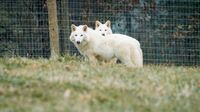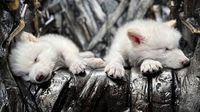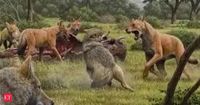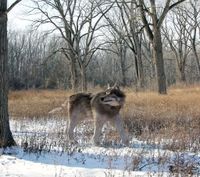In a groundbreaking announcement that has captured the attention of the scientific community and the public alike, Colossal Biosciences has successfully revived the long-extinct dire wolf, a species that roamed North America during the Pleistocene era. This remarkable achievement, which marks a significant milestone in the field of de-extinction, was revealed on April 8, 2025, and showcases the potential of modern biotechnology to resurrect creatures that last walked the Earth approximately 10,000 years ago.
Colossal Biosciences, a Dallas-based biotech company, has not only revived the dire wolf but is also ambitiously working towards the resurrection of the woolly mammoth by 2028. The company’s CEO, Ben Lamm, expressed his excitement about the project, stating, "Our team took DNA from a 13,000-year-old tooth and a 72,000-year-old skull and made healthy dire wolf puppies." This statement underscores the innovative approaches being employed to bring back these ancient species.
The dire wolves, now three in total, are named Romulus, Remus, and Khaleesi. They are currently being raised on a secure nature preserve registered with the U.S. Department of Agriculture, although the exact location remains undisclosed. All three pups were born through a complex process involving advanced genetic engineering and cloning techniques, which Colossal has pioneered.
To recreate the dire wolf, scientists began by extracting DNA from two ancient remains and comparing it with that of the gray wolf, its closest living relative. This comparison led to the identification of 20 distinct genetic traits across 14 genes that define the dire wolf's unique characteristics, including its size, coat color, and vocalizations. Colossal’s chief scientist, Beth Shapiro, noted, "We've taken a gray wolf genome, which is already genetically 99.5% identical to dire wolves, and edited those cells at multiple places in its DNA sequence to contain the dire wolf version of the DNA."
The birth of the pups was facilitated using surrogate dogs, which were selected to carry the embryos created from the edited gray wolf cells. Remarkably, no animals were harmed in the process, and the births were conducted via cesarean section to ensure the safety of the surrogates. Romulus and Remus were born in late 2024, while Khaleesi arrived in early 2025. Their names pay homage to both mythology and popular culture, with Romulus and Remus referencing the legendary founders of Rome and Khaleesi inspired by a character from the hit series "Game of Thrones."
Despite the excitement surrounding this achievement, not all experts are convinced that these pups can truly be classified as dire wolves. Dr. Julie Meachen, a prominent wolf researcher who has collaborated with Shapiro in the past, expressed skepticism, stating, "I don't think they are actually dire wolves. What we had is something new -- we have a mostly gray wolf that looks like a dire wolf." This sentiment raises important questions about the implications of genetic editing and whether the resulting animals can genuinely represent their ancient ancestors.
Colossal's work has not gone unnoticed, as the company has garnered significant investments from high-profile figures, including athletes like Tom Brady and Tiger Woods, as well as celebrities like Paris Hilton and filmmaker Peter Jackson. This financial backing is crucial for Colossal as it aims to expand its de-extinction efforts and continue its research into endangered species.
In addition to the dire wolf project, Colossal has also cloned four red wolves, a critically endangered species, demonstrating its commitment to conservation efforts. The company is currently collaborating with the State of North Dakota to help save its dwindling bison population, showcasing the broader implications of its technology beyond mere de-extinction.
However, the ethical considerations of reviving extinct species have sparked debate among scientists and bioethicists. Dr. Robert Klitzman, a geneticist and bioethicist at Columbia University, cautioned about the potential consequences of altering ecosystems, stating, "One wants to be careful if you're mucking around with genes, that there may be things we don't understand." He highlighted the risks of creating genetically modified animals that could disrupt existing wildlife or ecosystems.
Colossal’s ambitions extend beyond just bringing back the dire wolf and woolly mammoth. The company is also exploring ways to enhance the genetic diversity of endangered species, such as the pink pigeon, which has faced severe population declines due to habitat loss and predation. By using genetic editing techniques, Colossal aims to improve the reproductive health of these species and bolster their chances of survival.
As Colossal continues its groundbreaking work, the future of de-extinction and species conservation hangs in the balance. The company plans to conduct further research and experiments, with the hope that its technology can play a pivotal role in preserving biodiversity for generations to come. The dire wolf pups, Romulus, Remus, and Khaleesi, represent not just a scientific achievement but a glimpse into a future where humanity may have the power to resurrect lost species and restore ecological balance.
With the world watching closely, Colossal Biosciences stands at the forefront of a new era in biotechnology, where the boundaries of science are being pushed and the possibilities seem limitless. As they strive to unlock the secrets of the past and secure a future for endangered species, the question remains: what ethical responsibilities come with such extraordinary capabilities?









